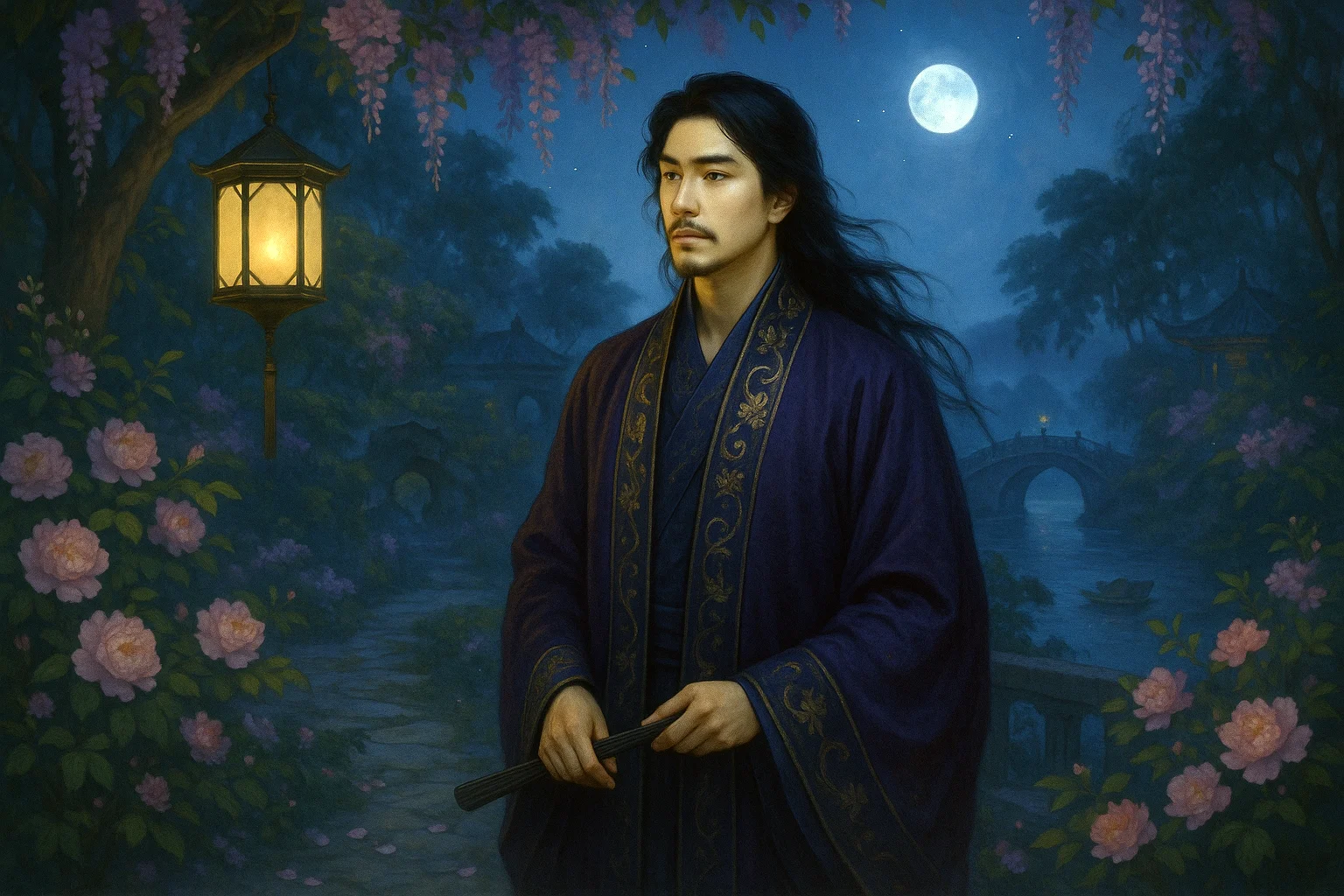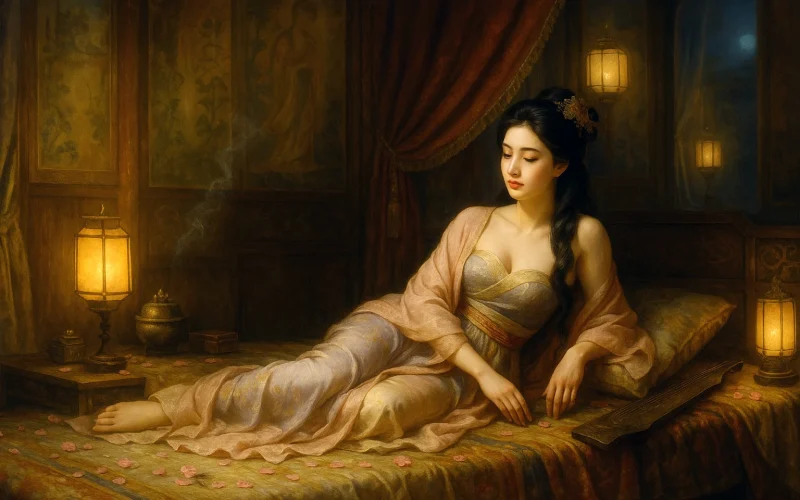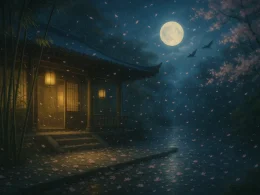There are many curtains in your care-free house,
Where rapture lasts the whole night long.
...What are the lives of angels but dreams
If they take no lovers into their rooms?
...Storms are ravishing the nut-horns,
Moon-dew sweetening cinnamon-leaves -
I know well enough naught can come of this union,
Yet how it serves to ease my heart!
Original Poem
「无题 · 重帷深下莫愁堂」
李商隐
重帷深下莫愁堂,卧后清宵细细长。
神女生涯原是梦,小姑居处本无郎。
风波不信菱枝弱,月露谁叫桂叶香。
直道相思了无益,未妨惆怅是清狂。
Interpretation
This lyrical masterpiece by Li Shangyin presents a multi-layered exploration of solitary femininity, where a secluded woman's romantic fantasies intertwine with profound existential melancholy. While ostensibly depicting feminine psychology, the poem subtly encodes the poet's own metaphysical contemplations on life's ephemeral nature and the paradox of unrequited yearning.
First Couplet: "重帷深下莫愁堂,卧后清宵细细长。"
Chóng wéi shēn xià mò chóu táng, wò hòu qīng xiāo xì xì cháng.
Layer upon layer drapes descend on Sorrowless Hall / As night's pure emptiness stretches endless after repose
The cascading curtains create a visual metaphor for psychological barriers, while "Sorrowless Hall" (莫愁堂) becomes ironic - the very naming of "no-sorrow" intensifies the pervasive melancholy. The tactile "endlessness" of the night transforms time itself into a palpable prison.
Second Couplet: "神女生涯原是梦,小姑居处本无郎。"
Shén nǚ shēng yá yuán shì mèng, xiǎo gū jū chǔ běn wú láng.
The Goddess's existence was always dream / The maiden's dwelling never knew a groom
The dual典故 of the Wu Mountain goddess (transient lover of kings) and the celibate river maiden constructs a dialectic of eroticism versus chastity. The revelation that both states - passionate encounter and virginal solitude - are equally illusory devastates conventional romantic narratives.
Third Couplet: "风波不信菱枝弱,月露谁叫桂叶香。"
Fēng bō bù xìn líng zhī ruò, yuè lù shuí jiào guì yè xiāng.
Storms care not that water-chestnut stems are frail / Who tells moon-dew to bless osmanthus leaves with scent?
Nature's indifference manifests through violent "storms" (societal forces) crushing delicate "stems" (feminine vulnerability), while the rhetorical question about osmanthus fragrance (talent/beauty) underscores cosmic apathy toward human worth. The botanical imagery forms an allegory of unrecognized virtue.
Fourth Couplet: "直道相思了无益,未妨惆怅是清狂。"
Zhí dào xiāng sī liǎo wú yì, wèi fáng chóu chàng shì qīng kuáng.
Though knowing longing brings no gain / This exquisite melancholy verges on sublime madness
The concluding paradox elevates futile desire to aesthetic transcendence. "Sublime madness" (清狂) redefines rationality itself, suggesting that the most profound human experiences exist beyond utilitarian calculations - a radical philosophical stance disguised as lovelorn complaint.
Holistic Appreciation
The poem constructs a metaphysical labyrinth where romantic disappointment becomes a portal to existential revelation. Each couplet dismantles conventional comforts: architectural security proves imprisoning, divine love stories reveal their fictiveness, nature demonstrates amoral brutality, and finally, reason itself is overthrown by the epistemology of desire. The progression mirrors spiritual awakening - from sheltered innocence through disillusionment to hard-won transcendence.
Artistic Merits
- Architectural Symbolism: The physical space (hall/curtains/bed) morphs into psychological landscape, blending Tang dynasty interior aesthetics with universal emotional states.
- Subverted Mythology: By deconstructing the goddess-maiden dichotomy, the poem challenges cultural archetypes of femininity.
- Botanical Semiotics: Water plants versus aromatic trees create a vegetative hierarchy mirroring society's arbitrary value assignments.
Insights
This ninth-century meditation anticipates modern existentialism by asserting that meaning emerges precisely through embracing life's inherent contradictions. The poem's ultimate wisdom lies not in resolving tension between desire and reality, but in recognizing that "sublime madness" - the passionate commitment to what we know is fleeting - constitutes our most authentic existence. It invites contemporary readers to reconsider emotional "uselessness" as potential gateway to liberated being.
Poem translator
Kiang Kanghu
About the poet

Li Shangyin (李商隐), 813 - 858 AD, was a great poet of the late Tang Dynasty. His poems were on a par with those of Du Mu, and he was known as "Little Li Du". Li Shangyin was a native of Qinyang, Jiaozuo City, Henan Province. When he was a teenager, he lost his father at the age of nine, and was called "Zheshui East and West, half a century of wandering".












